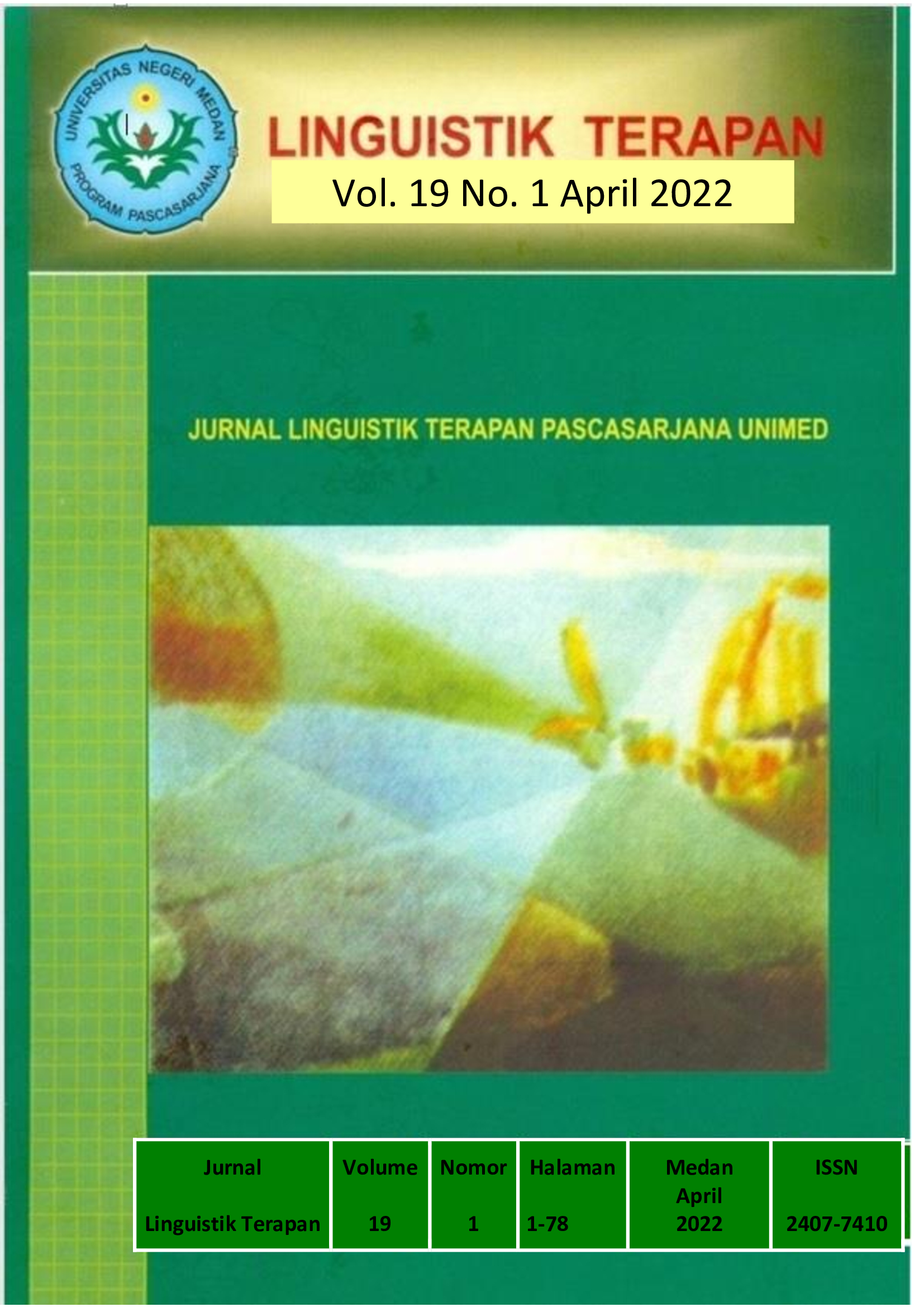TRANSITIVITY SYSTEM IN CNN ONLINE NEWS
DOI:
https://doi.org/10.24114/lt.v19i1.34328Keywords:
Metafunction, Transitivity System, Online News, CNNAbstract
This study was concerned with the types of transitivity system elements in CNN Online News. The objectives of this descriptive qualitative study were to discover: (1) the types of transitivity system, (2) the realization of transitivity system, and (3) the reasons for transitivity system realized in CNN Online News. The data of this study were clauses that consist of a transitivity system in 10 Covid-19 Online News taken from CNN Online News. The results of the study showed that: 1) CNN Online News realized all the types of process: Material, Mental, Relational, Behavioral, Verbal, and Existential process. The dominant process was Material Process. It was realized 214 (50,47%). CNN Online News realized participants: Actor, Goal, Sayer, Carrier, Attribute, Verbiage, Senser, Phenomenon, Target, Existing, Existence, Behaver, Token, Value, Receiver, Behavior, and Range. Actor and Goal were dominantly realized in the clauses of CNN Online News, there were 167 (26,38%) of Actor and 141 (22,27%) of Goal. The most dominant was Actor, and CNN Online News realized circumstances: Location, Cause, Manner, Accompaniment, Extent, Matter, Angle, and Role. It was realized 193 (60, 50%). The dominant was Location; 2) There were congruent realization and incongruent realization of transitivity system. The most dominant realization was congruent realization; 3) The reason why the types of transitivity system realized in CNN Online News is based on the context of the situation related to the field. Field stand for three entries, namely arena/social activity [+institutionalized/-institutionalized], participant™s characteristics [person/social] and semantic domain [+specialized/-specialized]. The most dominant was arena/social activity, especially [-institutionalized]. Keywords: Metafunction, Transitivity System, Online News, CNNReferences
Garson, David. (2012). Testing Statistical Assumptions. USA: G David Garson & Statistical Associates Publishing
Ghannam, D. (2011). Newspaper Ideology: A Critical Discourse Analysis of an Event Published in Six Lebanese Newspapers. Johannesburg: University of the Witwatersrand
Halliday, M.A.K., and Matthiessen, C.M. (2004). An Introduction to Functional Grammar. (3rd ed). London: Arnold
Halliday, M.A.K., and Matthiessen, C.M. (2014). Halliday's Introduction to Functional Grammar (4th ed). London: Arnold Graves, K. (2000). Designing Language Courses: a Guide for Teachers. Boston: Heinle & Heinle Publisher.
Hutabarat, E., Herman., Silalahi, D.E, & Sihombing, P.S.R. (2020). An Analysis of Ideational Meaning on News Jakarta Post about Some Good Covid-19 Related News. Voices of English Language Education Society, 4 (2) 142-151
Li Jing, and Li Fengji. (2019). A Case Study of Transitivity Analysis of Trump™s Winning Speech Based on Systematic Functional Grammar. International Journal of Language and Linguistics. Vol 7 No.4, 2019.
Miles, M.B., Huberman, A.M., and Saldana, J. (2014). Qualitative Data Analysis A method Sourcebook. 3rd ed. California: Sage
Mineshima, M. (2009). Discourse Analysis of News Texts by the Application of Systemic Functional Grammar. Niagata Institute of Technology. Pp. 101-123
Nugraha, I. S., & Mahdi, S. (2020). Transitivity System on Building Character of Mr. Summers in The Lottery by Shirley Jackson. Celtic: A Journal of Culture, English Language Teaching, Literature and Linguistics, 7(1), 35.
Suparto, A.D. (2018). Transitivity Analysis on Framing in the Online News Articles. Ranah: Journal Kajian Bahasa
White, P.R.R. (2006). Evaluative Semantic and Ideological Positioning in Journalistic Discourse-A new Framework for Analysis. In Larsen, (1st ed). Mediating Ideology in Text and Image: Ten Critical studies. John Benjamis, Amsterdam. Pp.37-69
Zhao, M., and Yi Zhang. (2017). A Transitivity Analysis of American President Donald J. Trump™s Inagural Address. International Journal of Liberal Arts and Social Science Vol.5, No.5
Downloads
Published
How to Cite
Issue
Section
License
Copyright (c) 2022 Nurul . Qomariah, Amrin . Saragih, Sri Minda Murni

This work is licensed under a Creative Commons Attribution-ShareAlike 4.0 International License.






